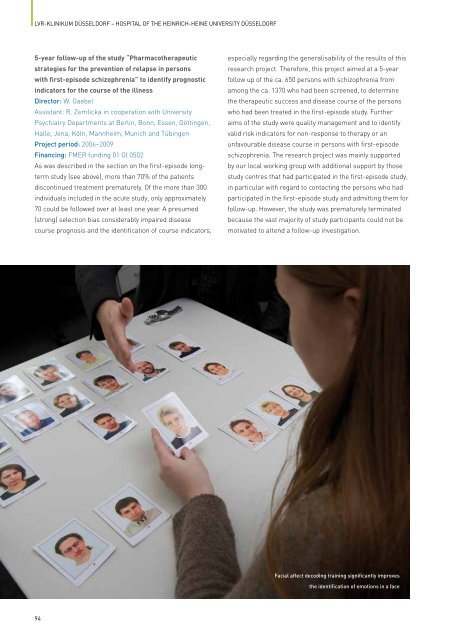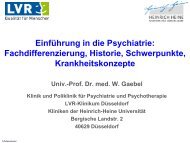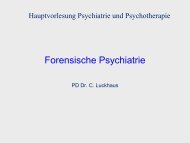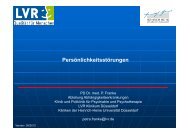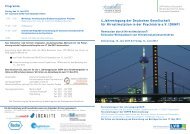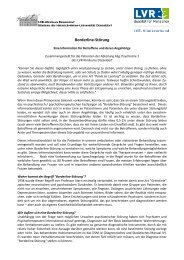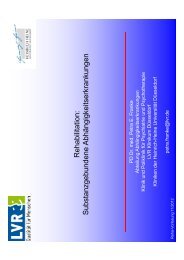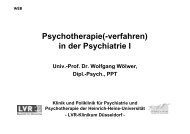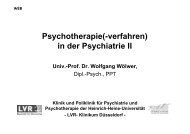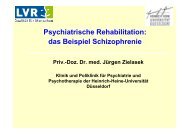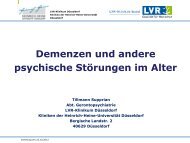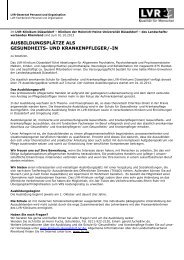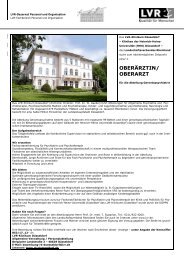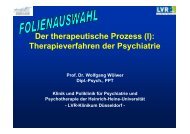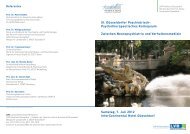LVR-Klinikum Düsseldorf Hospital of the Heinrich-Heine University ...
LVR-Klinikum Düsseldorf Hospital of the Heinrich-Heine University ...
LVR-Klinikum Düsseldorf Hospital of the Heinrich-Heine University ...
You also want an ePaper? Increase the reach of your titles
YUMPU automatically turns print PDFs into web optimized ePapers that Google loves.
<strong>LVR</strong>-KLINIKUM DÜsseLDORF – hOsPITaL OF The heINRIch-heINe UNIVeRsITY DÜsseLDORF<br />
5-year follow-up <strong>of</strong> <strong>the</strong> study “Pharmaco<strong>the</strong>rapeutic<br />
strategies for <strong>the</strong> prevention <strong>of</strong> relapse in persons<br />
with first-episode schizophrenia” to identify prognostic<br />
indicators for <strong>the</strong> course <strong>of</strong> <strong>the</strong> illness<br />
Director: W. Gaebel<br />
Assistant: R. Zemlicka in cooperation with <strong>University</strong><br />
Psychiatry Departments at Berlin, Bonn, Essen, Göttingen,<br />
Halle, Jena, Köln, Mannheim, Munich and Tübingen<br />
Project period: 2006–2009<br />
Financing: FMER funding 01 GI 0502<br />
As was described in <strong>the</strong> section on <strong>the</strong> first-episode longterm<br />
study (see above), more than 70% <strong>of</strong> <strong>the</strong> patients<br />
discontinued treatment prematurely. Of <strong>the</strong> more than 300<br />
individuals included in <strong>the</strong> acute study, only approximately<br />
70 could be followed over at least one year. A presumed<br />
(strong) selection bias considerably impaired disease<br />
course prognosis and <strong>the</strong> identification <strong>of</strong> course indicators,<br />
94<br />
especially regarding <strong>the</strong> generalisability <strong>of</strong> <strong>the</strong> results <strong>of</strong> this<br />
research project. Therefore, this project aimed at a 5-year<br />
follow up <strong>of</strong> <strong>the</strong> ca. 650 persons with schizophrenia from<br />
among <strong>the</strong> ca. 1370 who had been screened, to determine<br />
<strong>the</strong> <strong>the</strong>rapeutic success and disease course <strong>of</strong> <strong>the</strong> persons<br />
who had been treated in <strong>the</strong> first-episode study. Fur<strong>the</strong>r<br />
aims <strong>of</strong> <strong>the</strong> study were quality management and to identify<br />
valid risk indicators for non-response to <strong>the</strong>rapy or an<br />
unfavourable disease course in persons with first-episode<br />
schizophrenia. The research project was mainly supported<br />
by our local working group with additional support by those<br />
study centres that had participated in <strong>the</strong> first-episode study,<br />
in particular with regard to contacting <strong>the</strong> persons who had<br />
participated in <strong>the</strong> first-episode study and admitting <strong>the</strong>m for<br />
follow-up. However, <strong>the</strong> study was prematurely terminated<br />
because <strong>the</strong> vast majority <strong>of</strong> study participants could not be<br />
motivated to attend a follow-up investigation.<br />
Facial affect decoding training significantly improves<br />
<strong>the</strong> identification <strong>of</strong> emotions in a face


